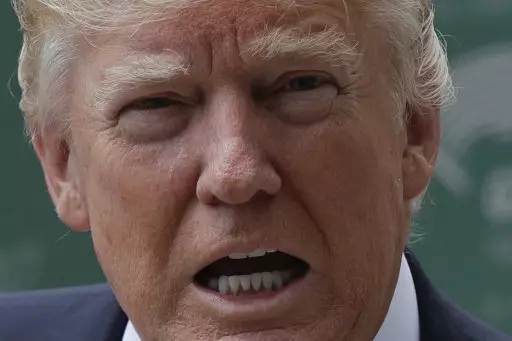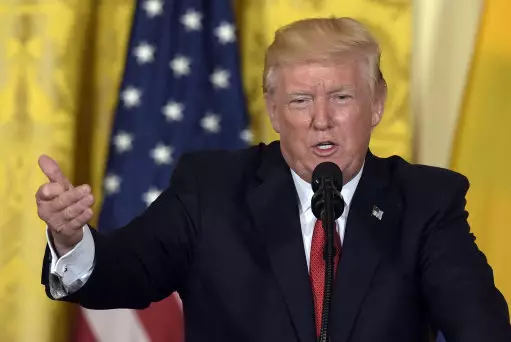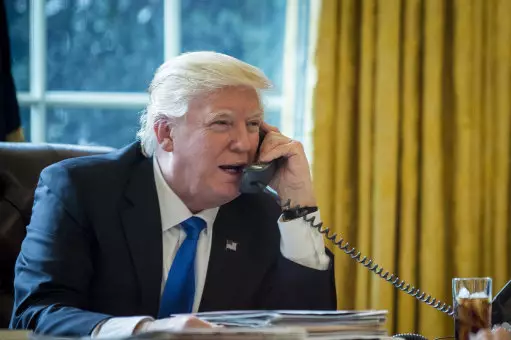
Earlier in May, the impeachment of Donald Trump was raised in the House Of Representatives. Al Green, the representative of the Ninth Congressional District Of Texas, was the man to call out the President of the United States.
Impeachment is designed to bring the accused's eventual removal from office - whether president or an official.
Credit: Business Insider
The US constitution states a president 'shall be removed from office on impeachment for, and conviction of, treason, bribery, or other high crimes or misdemeanours'. The latter can cover a lot of reasons.
But what does this involve? How long does it take? And what happens afterwards? These were all questions put to Professor of American Studies, Scott Lucas, of the University of Birmingham.
Professor Lucas began by explaining the proceedings before a president is impeached.

"The first step is for the lower house, the house of representatives, to find ground for impeachment," he told LADbible. "These are done through articles of impeachment, which could be a single allegation or multiple.
"The house then hears them and votes if the call is correct. It is a simple majority vote to see if the house supports impeachment. If they do, the president is impeached but he's not out of office.
"The second step is that it then moves to the Senate where you have a hearing - the equivalent of a trial. There are witnesses, provided by the Chief Justice of the Supreme Court, there can be attorneys, cross-examination, and even the president can testify."
After the Senate have heard the case they then go away in private, consider the evidence, and then come back to vote (a bit like a British jury). It takes a two-thirds majority to remove the person threatened with impeachment.
There have only ever been two previous calls for the impeachment of a president.

"Andrew Johnson was the first," explains Professor Scott. "This was after the civil war in 1868. He was acquitted in trial by a one-vote margin.
"The second president was Bill Clinton but the house did not get a majority to send it to the Senate so it never went to trial."
Al Green may have called for the third-ever impeachment of a president, but Scott warns we are 'not near impeachment'.
But what could make Trump guilty? The impeachment investigations will begin, but let's not forget that Donald Trump is already the subject of other investigations - these alone could strengthen the case.
Professor Scott said: "Parallel investigations are currently going on, by the FBI and other agencies, which may bring up links between Trump associates and Russia. Where it could become serious is if Trump is found to have obstructed justice.
"It started when he tried to get [James, the former head of the FBI] Comey to withdraw the investigation into [Mike] Flynn, and Trump asked Comey himself if he was under investigation.
"Comey will now testify in front of Senate Intelligence Office."

Credit: PA
Advert
So, from a Republican perspective, let's imagine the worst happens and Donald Trump is impeached as president. What happens next?
"After the trial, and if he is impeached, Mike Pence, the current vice president, becomes president," explained Professor Scott.
"No election is called," he continued. "The US elections are fixed [in terms of date] and there is no snap election.
"The 25th amendment to the constitution confirms the line of succession to the president. There are about 20 officials that are lined-up in order. After the vice-president, it is then the speaker of the house of representatives [currently the Republican, Paul Ryan]."

Credit: PA
Advert
Professor Lucas does not believe that the current president will be impeached.
"I don't think it will happen," he said. "It was overlooked that during the Nixon/Watergate saga that Nixon resigned before he was impeached.
"That impeachment began in 1974, a whole two years after the Watergate investigation started in 1972. That was a two-year process, we're only a few months into Trump's presidency.
"What I could suggest is that he could go for health reasons. He's not in good mental or physical health. So, I would say that would call an end to his presidency before any form of impeachment does."
Featured Image Credit: PATopics: Donald Trump